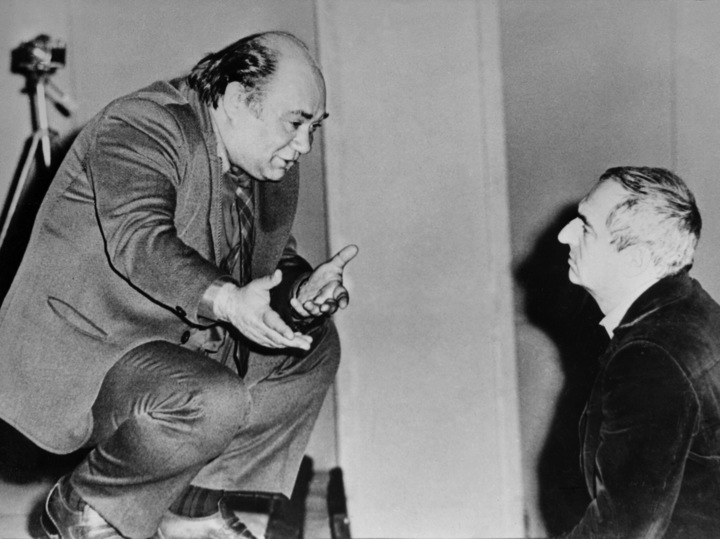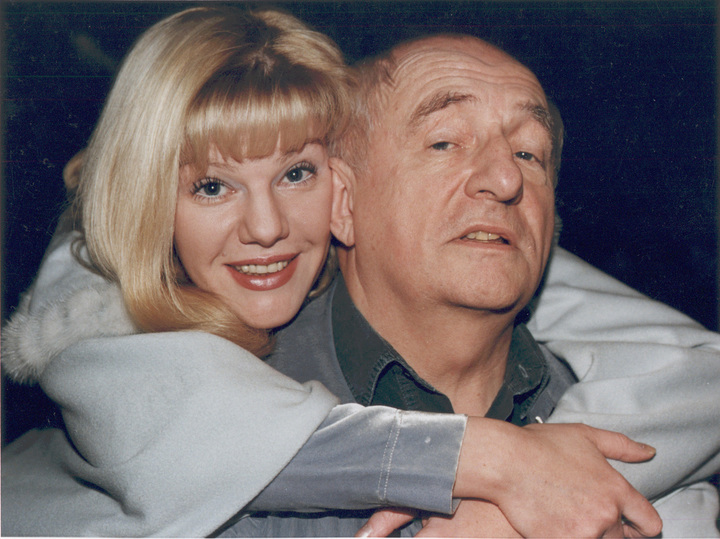Formulas and zigzags of love by Mark Zakharov: the great director would have turned 90
[ad_1]
On his 90th birthday there will be a lot of words around: about him, his performances, how he influenced the theater at the end of the 20th century and what has sprouted from him in the theater of the 21st century. What did he give to the next generation of directors and actors, and what secrets did he take with him? His performances remained on stage and on film, and books remained with reflections on the essence of the profession of director and actor, which can help to calculate the formula of love by which he worked and because of which his contemporaries ranked him among the cohort of greats.
And artists create formulas from themselves, from their biography – plagiarism will not help here. The boy, who lived with his mother, an actress, actually at first had no intention of devoting his life to the theater – he had heard all sorts of horrors about this profession from his mother and after school he applied to the Institute of Civil Engineering, but… Fate tripped him up, and for some reason he ended up in an old Moscow lane near GITIS, where for some reason he was accepted into the course of Professor I.M. Raevsky. So, by the will of fate, he began to study the ancient craft of acting.
Interesting evidence was found in the archives of the theater institute: for example, according to an extract from the order (No. 16 of January 30, 1954), based on the results of the winter examination session of the 1953/54 academic year, third-year student Mark Zakharov was enrolled on a normal scholarship. And based on the results of the spring test and examination session of the same year, he was transferred to the fourth year with enrollment in an increased scholarship.

In April 1955, after graduating from GITIS, Zakharov received a more than flattering description. Here is a document signed by the director of the institute N. Gorbunov, the dean of the acting department B. Dokutovich and the secretary of the party bureau S. Tikhonov: “Student Zakharov M.A. possesses the qualities of a sharp-character actor. During his stay at GITIS, he played a number of different roles and showed the ability to independently work on creating an image. Demanding demands on himself in his work and lack of complacency make it possible to believe that M. Zakharov will be a valuable member of the theater team in which he will work.
During his stay at GITIS, student Zakharov played the roles of: Krogst (“Nora”), Vasin (“Tanya”), Sorina (“The Seagull”), Count Lubin (“Provincial”) and others, where he proved himself to be an interesting and bright character actor “
He himself believes that in the acting profession he truly mastered only the art of stage combat with swords, daggers and the ability to fall from the stairs face down, to the side, backwards and unexpectedly with a running start. What is this – low self-esteem?
The newly minted comedian walks around Moscow theaters, knocks and asks: “Are extra actors needed?” But the capital’s theaters have enough of their own to spare. But a ray of hope flashed when Yuri Zavadsky wanted to take him into the troupe of the Mossovet Theater. Zakharov really wanted to please. Later he would call this an act of humiliation for himself and formulate: “I still can’t calmly accept those who come to my theater with the sole purpose of being liked.”
By the way, Zavadsky thought about taking Zakharov with another graduate of the Moscow Art Theater School, Galya Volchek, but changed his mind about both. Both applicants did not know then that they would go in parallel: in 1972, on the same day, they would be appointed chief directors in serious theaters – Zakharov in the name of the Lenin Komsomol, and Volchek in Sovremennik. And both will pass away in one year, with a difference of two months.

In the mid-50s he left for Perm – to the regional drama theater. He receives a good salary there of 690 rubles, which after the Khrushchev reform turned into a modest 69.
He worked in Perm for three years, tried to play, imitating Georgy Vitsin, who at that time was thundering at the Theater. Ermolova. And, I must say, actor Zakharov did not go unnoticed by the reviewers. “… Mark Zakharov speaks poetry more easily than all the young artists and sings better than anyone else,” theater critic V.B. Blok wrote in his report about the show of creative youth of the Molotov region.
“…Zakharov’s performance of the role of Leshchev in the play “Comrades of Romantics” captivates with its extraordinary organicity, gentleness, absence of any pressure, great stage charm and rare infectiousness…” In fact, the performance was demolished, and Zakharov was the only one praised in the “Theater” magazine.

He also wrote children’s poems for a local publishing house, drew cartoons for a youth newspaper, spoke on the radio and composed theatrical skits. In the end, he ended up at a local university, more precisely, in a student theater group, where for the first time as a director he staged “The Aristocrats” based on Pogodin’s play. That’s where he tasted this director’s “poison” and fell ill with directing for the rest of his life. “…I never dreamed of being a director, but when, by chance, it seems to me, I came into contact with it, I realized and felt like a person who had some genetic and psychological predisposition to this profession. In subsequent years, this feeling grew stronger.” In Moscow, where the young director returned, he was finally brought into the director’s orbit from among the actors by Valentin Pluchek at the Satire Theater.
By the way, it was in “Satire” that he would stage one of his best performances – “A Profitable Place” based on Alexander Ostrovsky, a playwright by the grace of God. True, he was placed as a replacement without any hope that the audience of this theater would even sit through to the end. And some of them were openly indignant: “It’s a disgrace! We don’t want to watch this.” Someone was handing over tickets. And the chief administrator, like some desperate hero of the most Russian of Russian playwrights, went all-in. That evening he opened the doors to the box office and addressed the gloomy audience who were preparing to hand over tickets: “…You have never seen such a performance before!!! Go everyone… For those who don’t like it, we’ll refund your money! When it’s finished, I’ll wait for you in this window.” But when “Profitable Place” by the little-known director Zakharov ended, not a single soul demanded the money back.
Now no one remembers such an actor Zakharov from the Perm Regional Theater or the Moscow Theater of Miniatures Vladimir Polyakov, but everyone knows and for a long time will know and remember the Master of Directing Mark Anatolyevich Zakharov, who knew how to compose such worlds that, having once entered them, you did not want leave.

A magician and sorcerer who had special knowledge about the acting and human race. He probably knew some kind of spell that allowed him to derive his formula for love. Both as a method of work and as a film of the same name that you want to watch endlessly. “True love arises in a person only if he does NOT know how to explain why he loves.” But the fact of the matter is that, having said this once, he knew how to explain to others what love is – for people, for life, for the theater, for the country.
It was he who shortened the tiresome name of the theater – “named after the Lenin Komsomol” to “Lenkom” – who was the first to raise the stage face of the Kazan Mother of God above the scenery in “Juno” and “Avos”. It was for the first time in the history of the Soviet theater that Orthodox church hymns were heard and a huge royal St. Andrew’s flag flew almost under the grate. And of course, the final hallelujah, which was beautifully sung by artists and musicians on stage, was also performed for the first time by him… And this did not correspond to the strict ideological guidelines of party censorship.
Therefore, there was a beat: Zakharov, together with the director, was summoned to meetings of the bureau of the Moscow City Committee of the CPSU in connection with “the propaganda of rock music” (what are you singing there?) and “mistakes in the repertoire policy of the Komsomol theater.”
Zakharov is the brilliant artists with whom he worked or whom he trained – Evgeny Leonov, Tatyana Peltzer, Oleg Yankovsky, Alexander Zbruev, Nikolai Karachentsov, Alexander Abdulov, Inna Churikova, Dmitry Pevtsov, Alexander Lazarev, Andrey Sokolov, Alexandra Zakharova. The only and beloved daughter.

It was he who was the first to publicly burn his party card and sat at meetings of the Supreme Council of the new Russia, where parliamentary battles took place, the courage of which did not appear to the Soviet people in their most fantastic dreams. And then he translated this furious and contradictory time into stage language, without betraying the theatrical language.
He admired the poet Velimir Khlebnikov, in whom he saw how the boundaries between meaning and openly musical intrusion into the depths of the subconscious were blurred. And he himself, without realizing it, knew how to blur and sometimes demolish boundaries in order to reach another level of knowledge of existence and invite others with him – artists, directors, spectators.
Here are just a few quotes from the Master:
About the theater. “The theater in my mind is always a poetic fantasy, with the most daring prosaic tolerances and scrupulous everyday details,” he wrote.
About the performance. “The idea of a great performance should not fit into a simple formula. The hidden meaning of a great creation should not be immediately given into one’s hands.”
About music. “Loud modern music in the theater is an amazing thing, but even more amazing is the music that you can’t hear. When one silence gives way to another, of exactly the opposite nature, when the rhythm from a simple stage concept is stretched into a mysterious chimera…”
About solemnity. “I am sometimes prone to some excessive solemnity. I’m struggling with this. However, I noticed long ago that the struggle is going on with varying degrees of success.”
About directing. “Directing is a system of creating what God does not know (an arbitrary version of Berdyaev’s formula…), the art of directing is the right and ability to manage the emotions and economic resources of people involved in the element of creation subject to the author.”
About the truth. “The truth is that we have more than one. The truth of life in our complex art scatters into thousands of options and variations. Moreover, the pieces of glass sometimes look like diamonds.”
About art. “The development of art is not just an upward straight line, but rather a combination of artistic zigzags.”
[ad_2]
Source link






